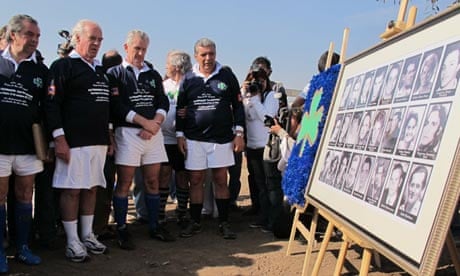The surviving members of a Uruguayan rugby team have played a match postponed four decades ago when their plane crashed in the Andes, stranding them for 72 days and forcing them to eat human flesh to stay alive.
The Old Christians squared off on Saturday in Santiago against the Old Grangonian, the former Chilean rugby team they were supposed to play back in 1972 when their flight went down. Their story became the basis of a best-selling book and Hollywood film.
"At about this time we were falling in the Andes. Today, we're here to win a game," crash survivor Pedro Algorta, 61, said as he prepared to walk on to the playing field surrounded by the cordillera – the jagged mountains that trapped the group.
During the anniversary ceremony military jets flew over the field, dropping parachutists draped in Chilean and Uruguayan flags. In a corner, survivors wept when officials unveiled a commemorative frame with pictures of those who died.
"The conditions were more horrifying than you can ever imagine. To live at 4,000m without any food," said another survivor, Eduardo Strauch, 65. "The only reason why we're here alive today is because we had the goal of returning home … (Our loved ones) gave us life. They made the sacrifice for others."
The Uruguayan air force plane that carried the team crashed in a mountain pass in October 1972 en route from Montevideo to Santiago. Of the 45 passengers aboard, 16 survived by feeding on dead family members and friends preserved in the snow.
"I think the greatest sadness I felt in my life was when I had to eat a dead body," said Roberto Canessa, 59, who was a medical student at the time of the crash.
"I would ask myself: is it worth doing this? And it was because it was in order to live and preserve life, which is exactly what I would have liked for myself if it had been my body that lay on the floor," he said
Desperate after more than two months in the mountains, Canessa and Fernando Parrado left the crash site to seek help. After 10 days of trekking, they spotted Sergio Catalan, a livestock herder in the foothills of the Chilean Andes. The conditions were such that the pair could not reach him, but from afar they heard him say one word: "Tomorrow".
"With that, our suffering ended," Canessa said.
Catalan, who rode to the nearest town to alert rescuers, returned to meet the survivors on Saturday in a hat and poncho. He walked slowly with the aid of a cane and pointed at the sky when helicopters hovered over the field just as they did 40 years ago.
Carlos Páez, 58, waved a small red shoe at a helicopter carrying Parrado, as he did when the Chilean air force rescued him and the others. Parrado gave a similar shoe to his friends at the crash site before he left for the cordillera and guided rescuers back.
"I came back to life after having died," said Parrado, whose mother and sister died in the Andes. "It's something that very few people experience." He said the experience scarred him but gave him a new-found appreciation for life.
"Since then I have enjoyed fully, carefully but without fear. I tried to enjoy my friend, my dog, my passions, a second at a time," said Parrado, who has since worked as a TV host, race car driver and motivational speaker.
Another survivor Daniel Fernandez, 66, held the trophy that would have been the reward for the game to be played the day of the crash.
The ordeal "taught me that we set our own limits", he said. "If I had been told: 'I'm going to leave you in a mountain 4,000m high, 20C below zero (-4F) in shirtsleeves,' I would have said: I last 10 minutes.' Instead, I lasted 72 days."
